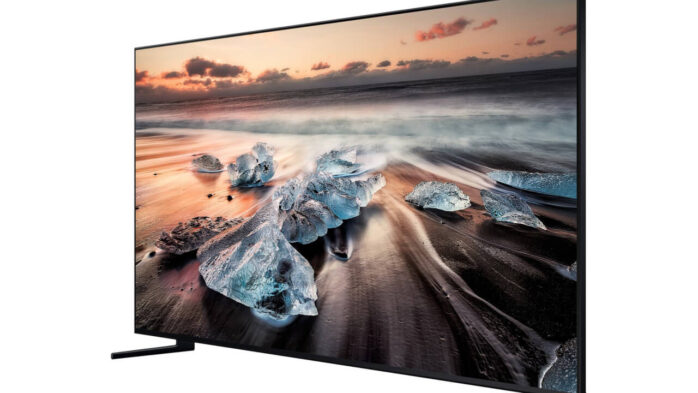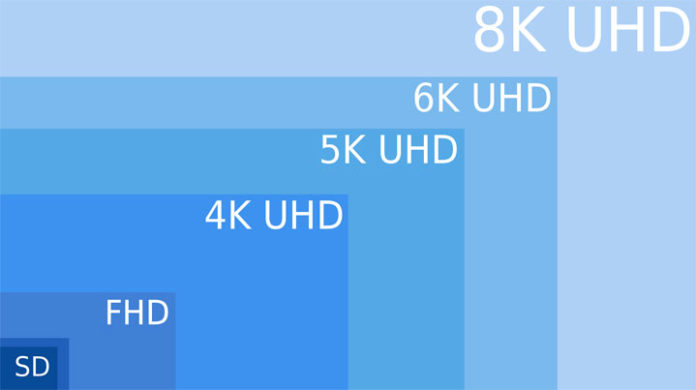
A good video resolution is something which is really important for a better viewing experience. We have seen companies upgrading from lower resolutions like 144p to higher resolutions such as 4K. This shift has happened with the move in technology from traditional TVs to smart TVs. For a long time now, the Ultra HD resolution of 4K or 2160p has been the winner. This resolution gives you 4 times the quality when compared to the video resolution of 1080p. However, most people out there haven’t even experienced 4K televisions up till now. But it’s common for everyone to wish to experience what’s latest in technology. So finally when some of them have saved up money to buy a 4K TV, they’ve been hit hard with the introduction of 8K TVs.
So the question that everyone is asking now, is What’s the difference between 4K and 8K? Is 8K really better than 4K resolution? And is it really worth spending money on? Well, in this article, we’ll try answering each and every one of those questions. So let’s get started.
4K vs 8K: A Comparison Between Them

What is 8K?
So 8K is basically a video resolution of 7680 x 4320p, which is four times the 4K resolution. This resolution gives you a real-life experience when you are watching something on the TV screen. But the fact that Ultra HD or 4K quality in itself is really good video quality, makes us ask ourselves why exactly do we need 8K. Also, finding content that is originally finished in 4K video quality is difficult till now. So why are companies coming up with 8K TVs when there isn’t any content.
Well, this is because more and more people are becoming comfortable with big TVs in their homes. And with bigger TVs, 8K technology will be able to cover more pixels, thus giving you a more detailed picture. Now that being said, 8K will never be suitable for smaller sized TVs, because if the TV is small, then you’ll hardly notice any difference in the quality.
What is 4K?
Now that you know something about 8K, you should also learn something about 4K. So 4K video resolution is 3840×2160p, which means it holds 8,294,400 pixels as information, which is four times the 1080p quality. After years of struggle, 4K has now become the standard resolution. 4K TVs were expensive when they first came like 8K TVs are now. But eventually, the price of 4K TVs has fallen down and they are now quite affordable for the general public.
Even though the 4K TVs are gaining more popularity, most of the content you watch in 4K isn’t originally finished in 4K. Most movies and TV shows, even the latest ones like Avengers: Endgame was finished in 2K. But all good companies do their best in Upscaling the low quality to 4K video quality in their 4K TVs.
Upscaling
To understand more about 8K, you need to be well aware of Upscaling. Upscaling is basically stretching the low-quality video to fit the aspect ratio of the high-resolution TV. This is what happens when you play a 1080p or 4K video on an 8K TV. For instance, a 4K video holds 8.3 million pixels, whereas 8k TV stores about 33 million pixels. So there’s a huge gap that needs to be filled. But the question is, won’t stretching a video that much ruin its quality? Well, that is where the powerful processors and programming used by the manufacturers come in. We have learned that the Samsung Q900R 8K QLED TV uses a very powerful AI-powered quantum processor, which can upscale low-resolution videos and gives more clarity to the picture.
So basically, the Upscaling quality totally depends on the technology used by TV brands. And if the Upscaling technology is good, then it will give you better video quality with deep black levels and enhanced colors.
This might have been enough to give you an idea about Upscaling, but if you still aren’t satisfied, then you can read more about this in the article by MakeUseOf.
Original 8K Content
By now, you must have realized how upscaling technology makes low-quality content work on high-resolution TV. But why exactly do we need upscaling? Why can’t we just watch originally finished 8K content in 8K TVs? Well, that is because there isn’t much 8K content out there. As we have already learned that it is even hard to find original 4K content for 4K TVs, so it is highly unlikely that you’ll see original 8K content in gaming, TV shows or movies in the near future. But still, if you want to spend your money on 8K TVs, then it better has good Upscaling technology. Or else, you’ll be just watching 1080p or 4K content in 8K TV without any difference in quality.
TV Sizes
Now let’s talk about TV sizes. So if are looking for a small TV with a screen size below 40 inches, then having a maximum resolution of 1080p is perfect. Because size below this will be too compact even for 4K resolution. The TV sizes from 40 inches to 70 inches are perfect for getting the best out of 4K resolutions. You can also go with 8K resolutions with TV sizes above 60 inches, but if you want to spend extra money on 8K, then do it on the screen size above 70 inches. Because below this screen size, you won’t be able to tell much difference between 4K and 8K quality. As we’ve already told, 8K stores 33 million pixels, so it definitely needs a huge screen to display that much information.
Price
4K TVs were really expensive at first, but now you can even find a good performing 4K TV under $700. So, now more and more people are comfortable spending money on 4K TVs to experience better picture quality. On the other hand, 8K TVs are way too expensive when compared to 4K TVs. So you’ll have to pay a huge amount of money if you want to experience low-quality content upscaled in 8K. And believe us that we are not exaggerating when we are using the phrase ‘Huge amount of money’. They are really expensive in the market.
Why You Shouldn’t Buy 8K TV
- 8K TVs are very expensive.
- You will experience very little difference between 4K and 8K TV unless you sit very close to a very large screen 8K TV.
- To get the best out of 8K TV you need 8K content which is hardly available right now.
- To stream 8K content, you need a really high-speed internet connection which will also consume a lot of data.
Wrapping Up
And now let’s talk about the elephant in the room. Do you really need to spend money on 8K TVs? Well, if you are willing to go with a big sized TV that can really upscale the video quality to 8K, then you can go for it. And if you are thinking that without an 8K TV, you’ll be left behind, or you’ll not be able to experience your favorite shows in their best quality, then that isn’t the case. Honestly, after the 4K vs 8K comparison, you can figure out that you are perfectly fine with a 4K TV because that’ll give you the best quality according to the content currently available. And even with upscaled quality in 8K TVs, the difference in quality will be not much, especially if you’re using a small-sized 8K TV.
Finally, we would like to say that, for 8K to be noticeable to the user, it requires a massive screen which is good for stadiums, theaters, and other large hall areas.




![Best 32 Inch TV Under $150 [With Buying Guide] Best 32 Inch TV Under $150](https://specstalk.com/wp-content/uploads/2021/11/Best-32-Inch-TV-Under-150-218x150.webp)
